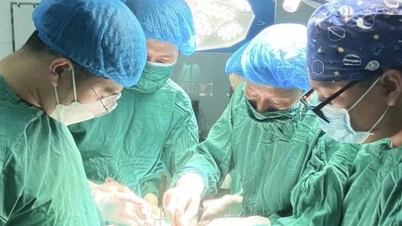For nearly a year now, Mr. AT (30 years old, from Phu Tho ) has been suffering from frequent stomachaches when defecating, accompanied by constipation and little by little fecal incontinence. Thinking it was just a common digestive disorder, he subjectively did not go to the doctor. Recently, when he discovered white parasite segments in his stool, wriggling like tapeworm segments, he went to the Central Hospital for Tropical Diseases for examination.
At the On-Demand and International Medical Examination and Treatment Center, after having parasitic tests done, Mr. T. was prescribed an enema to prepare for a colonoscopy. After the enema, the doctors recorded a tapeworm more than 3 meters long that was excreted in the stool, still alive, parasitizing in the intestines and colon.
Taking a medical history, the patient said he had a habit of eating raw vegetables and had not been dewormed for a long time. He suspected he was infected with tapeworms due to eating unsanitary raw vegetables that may contain tapeworm eggs.
Dr. Le Nguyen Minh Hoa, Chief Technician of the Department of Microbiology and Molecular Biology, after receiving the sample, through initial observations, we suspected that this was a beef tapeworm (Taenia saginata), however, it was necessary to differentiate it from a pork tapeworm (Taenia solium). To accurately identify the species of tapeworm, it is necessary to collect the head of the tapeworm - the part that carries the identifying characteristics. Therefore, the patient will have to take a laxative to excrete the entire tapeworm, including the head, to avoid recurrence.
Dr. Nguyen Thi Thu Huyen, Center for Medical Examination and Treatment on Demand and International, said that after the identification results are available, the patient will be prescribed specific treatment by the doctor. Depending on the type of worm and the level of infection, the doctor may prescribe specific medication, combined with laxatives to expel the worm. After treatment, the patient needs to be monitored with periodic stool tests for several weeks to several months to ensure that the worm has been completely eliminated, with no remaining eggs or segments in the intestines.
According to Dr. Huyen, tapeworms are parasites that can exist silently in the body for many years without showing obvious symptoms. Some patients may experience symptoms such as dull abdominal pain, bloating, indigestion, nausea, and weight loss despite eating normally. In many cases, the first sign is the discovery of tapeworm segments crawling out in the stool.
Regarding the mechanism of infection, Dr. Huyen analyzed that tapeworms enter the human body through the digestive tract, through eating larvae or eggs in contaminated food. With beef tapeworms, the main source of infection is raw or undercooked beef. More dangerously, pork tapeworms are not only transmitted through meat infected with larvae, but their eggs can also be transmitted from person to person through the feces - hands - mouth if hygiene is poor. Once in the body, the eggs hatch into larvae, penetrate the intestinal wall and can move to the brain, eyes, muscles ... - a dangerous complication that can be life-threatening.
At the same time, Dr. Huyen warned that tapeworm eggs and larvae can be transmitted through contaminated food, water or soil. Unsafe eating habits such as eating rare meat, raw blood pudding, unwashed vegetables, drinking tap water or not regularly deworming all increase the risk of parasitic infection. Each tapeworm segment can contain thousands of eggs. If not treated completely, the eggs will continue to spread, increasing the risk of reinfection for the patient and the community.
Dr. Huyen emphasized: “To prevent disease, everyone needs to maintain personal hygiene, wash hands with soap before eating and after using the toilet, eat cooked food and drink boiled water, limit eating rare meat or raw vegetables that have not been thoroughly processed. At the same time, deworming should be done periodically every 6 months, especially for children, the elderly and people with weak immune systems.”
Source: https://baophapluat.vn/phat-hien-san-day-dai-hon-3m-vi-thoi-quen-nhieu-nguoi-hay-mac-phai-post553735.html



![[Photo] National Assembly Chairman Tran Thanh Man holds talks with New Zealand Parliament Chairman](https://vphoto.vietnam.vn/thumb/1200x675/vietnam/resource/IMAGE/2025/8/28/c90fcbe09a1d4a028b7623ae366b741d)

![[Photo] General Secretary To Lam attends the opening ceremony of the National Achievements Exhibition](https://vphoto.vietnam.vn/thumb/1200x675/vietnam/resource/IMAGE/2025/8/28/d371751d37634474bb3d91c6f701be7f)







































































































Comment (0)